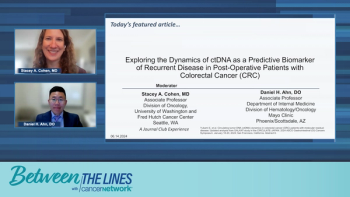Articles by Stacey A. Cohen, MD

Panelists discuss how minimal residual disease (MRD) detection in patients with colorectal liver metastases (CLM) in the GALAXY study predicts both the benefit of adjuvant therapy and overall prognosis, potentially guiding more personalized treatment decisions.

Panelists discuss how the 24-month data from the GALAXY study presented at the European Society for Medical Oncology (ESMO) 2024 meeting underscore the importance of minimal residual disease (MRD) status and circulating tumor DNA (ctDNA) clearance as key prognostic and predictive factors in colorectal cancer (CRC) management.

Panelists discuss how treatment strategies for circulating tumor DNA (ctDNA)–positive colorectal cancer (CRC) are evolving, with a focus on tailoring interventions based on molecular findings to improve patient outcomes and minimize unnecessary therapies.

Panelists discuss how results from the GALAXY study reveal that circulating tumor DNA
(ctDNA) status is a powerful predictor of outcomes and treatment benefit in patients with colorectal cancer (CRC), potentially revolutionizing personalized treatment approaches.

Panelists discuss how the GALAXY study data demonstrate the effectiveness of circulating tumor DNA (ctDNA)–based minimal residual disease (MRD) monitoring in patients with resected colorectal cancer (CRC), potentially improving postsurgical care and outcomes.

Panelists discuss how insights from the INTERCEPT, BESPOKE, COSMOS-CRC-01, and GALAXY studies are advancing our understanding of circulating tumor DNA’s (ctDNA) utility in colorectal cancer management, from early detection to treatment monitoring.

Panelists discuss how the DYNAMIC trial data demonstrate the potential of circulating tumor DNA (ctDNA)–guided therapy to inform and optimize adjuvant chemotherapy decisions in patients with stage II colon cancer.

Panelists discuss how minimal residual disease (MRD) testing in colorectal cancer (CRC) is facilitating the development of chemo-sparing strategies while maintaining effective control of residual disease.

Panelists discuss how minimal residual disease (MRD) detection in colorectal cancer (CRC) is improving postsurgical treatment decision-making and enabling more effective monitoring of patient outcomes.

Panelists discuss how circulating tumor DNA (ctDNA) is revolutionizing colorectal cancer (CRC) management by enabling more personalized and precise approaches to diagnosis, treatment selection, and monitoring of disease progression.

Panelists discuss how colorectal cancer rates are increasing, particularly among younger adults, while highlighting the potential of circulating tumor DNA (ctDNA) technology to improve early detection and treatment monitoring.

Stacey A. Cohen, MD, and Daniel H. Ahn, DO, share their key takeaways on the clinical utility of ctDNA in the treatment of patients with colorectal cancer.

Experts on colorectal cancer brainstorm ways to optimize clinical research on ctDNA and discuss patient perceptions of ctDNA testing.

Daniel H. Ahn, DO, and Stacey A. Cohen, MD, discuss the COBRA clinical trial, which evaluated rates of ctDNA clearance in patients with colorectal cancer receiving assay-directed therapy.

Stacey A. Cohen, MD, and Daniel H. Ahn, DO, provide comprehensive insights on the DYNAMIC clinical trial, an interventional study of circulating tumor DNA in colorectal cancer.

Colorectal cancer specialists review recent updates from BESPOKE-CRC evaluating the utilization of circulating tumor DNA for informing adjuvant therapy in patients with colorectal cancer.

Medical oncologists discuss whether ctDNA clearance can serve as an acceptable surrogate end point in the treatment of patients with colorectal cancer.

Daniel H. Ahn, DO, and Stacey A. Cohen, MD, engage in a comprehensive discussion on recent findings from the GALAXY study in CIRCULATE-Japan.

Experts on colorectal cancer share insights on optimizing the frequency of ctDNA detection and discuss potential ways to overcome challenges associated with MRD detection.

GI medical oncologists review recent findings from the INTERCEPT study evaluating the prognostic performance of circulating tumor DNA in clinical practice.

Stacey A. Cohen, MD, and Daniel H. Ahn, DO, discuss the role of circulating tumor DNA (ctDNA) as a biomarker in colorectal cancer and provide clinical insights on screening modalities.

Future Perspectives on MRD Testing in Colorectal Cancer
ByJohn Strickler, MD,Aparna Raj Parikh, MD, MS ,Stacey A. Cohen, MD,Arvind Dasari, MD, MS,Michael Foote, MD The expert panel concludes its discussion with a focus on the future of MRD testing in colorectal cancer, highlighting the treatment landscape’s current strengths and challenges.

BESPOKE CRC: The Impact of ctDNA-Guided Therapy in CRC
ByJohn Strickler, MD,Aparna Raj Parikh, MD, MS ,Stacey A. Cohen, MD,Arvind Dasari, MD, MS,Michael Foote, MD Focusing on the BESPOKE CRC study, John H. Strickler, MD, reviews recent updates presented at ASGO GI 2024 and discusses subset analyses from the trial.

The Study Design and Early Findings from the INTERCEPT Study in CRC
ByJohn Strickler, MD,Aparna Raj Parikh, MD, MS ,Stacey A. Cohen, MD,Arvind Dasari, MD, MS,Michael Foote, MD An overview of the rationale and study design of the INTERCEPT study in patients with colorectal cancer, with a focus on the early key findings.

Patient Profile 3: A 62-Year-Old Woman with Colon Cancer
ByJohn Strickler, MD,Aparna Raj Parikh, MD, MS ,Stacey A. Cohen, MD,Arvind Dasari, MD, MS,Michael Foote, MD Arvind N. Dasari, MD, MS, presents the third patient profile of the discussion, a 62-year-old woman with colon cancer, highlighting the role of MRD testing in guiding treatment decisions in the surveillance setting.

Initial Results from Phase 2 COBRA Study in Colorectal Cancer
ByJohn Strickler, MD,Aparna Raj Parikh, MD, MS ,Stacey A. Cohen, MD,Arvind Dasari, MD, MS,Michael Foote, MD Stacey Cohen, MD, reviews the initial results from the phase 2 COBRA study focused on ctDNA as a predictive biomarker in adjuvant chemotherapy for patients with stage II colon cancer.

Rationale and Study Design of CIRCULATE-NORTH AMERICA in CRC
ByJohn Strickler, MD,Aparna Raj Parikh, MD, MS ,Stacey A. Cohen, MD,Arvind Dasari, MD, MS,Michael Foote, MD Arvind N. Dasari, MD, MS, gives an overview of the rationale and study design of the phase 2/3 CIRCULATE-NORTH AMERICA clinical trial.

Colorectal Cancer: Key Updates from GALAXY At ASCO GI 2024
ByJohn Strickler, MD,Aparna Raj Parikh, MD, MS ,Stacey A. Cohen, MD,Arvind Dasari, MD, MS,Michael Foote, MD Experts on colorectal cancer provide comprehensive insights on the GALAXY study, highlighting key updates that were presented at ASCO GI 2024.

DYNAMIC Trial: ctDNA Analysis Guiding Adjuvant Therapy in Early-Stage CRC
ByJohn Strickler, MD,Aparna Raj Parikh, MD, MS ,Stacey A. Cohen, MD,Arvind Dasari, MD, MS,Michael Foote, MD Aparna Parikh, MD, reviews the DYNAMIC trial, which is focused on ctDNA-guided adjuvant therapy in early-stage colorectal cancer.

Patient Profile 2: A 39-Year-Old Woman with High-Risk Stage II CRC
ByJohn Strickler, MD,Aparna Raj Parikh, MD, MS ,Stacey A. Cohen, MD,Arvind Dasari, MD, MS,Michael Foote, MD Stacey Cohen, MD, presents the case of a 39-year-old woman with high-risk stage II colorectal cancer, highlighting how ctDNA helped inform treatment selection.










